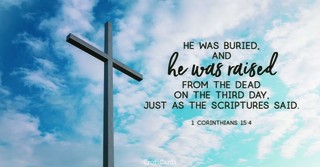
- Recent Translations
- All Translations
1 Corinthians 15:37
Share
Settings
1 Corinthians 15:37 in Other Translations
1 Corinthians 15:37 Meaning and Commentary
And that which thou sowest, thou sowest not that body that
shall be
The sower, for instance, does not take a stalk of wheat in its blade, and ear, and full corn in the ear, encompassed with the husk, and sow it in the earth, which is the body or form in which it appears when it rises up again, and is come to its full growth:
but bare grain (or naked grain) it may chance of wheat, or some
other grain;
wheat, or any other grain, is cast into the earth naked, beat out of the husk; and that selfsame grain rises up again, clothed with additional verdure, beauty, and fruitfulness; and so the body which comes out of its mother's womb naked, and returns naked again, ( Job 1:21 ) to which the apostle seems to allude, will rise again the same body, though with additional glories and excellencies; so that if it should be asked, how is it possible that a dead body can be raised up again? the possibility of it may be seen, in the quickening and raising up of a grain of wheat, that first rots and dies; and if it be inquired with what body the dead will be raised, it may in some measure be observed in this instance, that though it will be the same body, yet with different and excelling qualities: this simile seems to have been much in use among the Jews, to illustrate this doctrine, and we have some traces of it still in their writings F15:
``Cleopatra the queen asked R. Meir, saying, I know that the dead shall live, for it is written, "they of the city shall flourish like grass of the earth", ( Psalms 72:16 ) but when they rise, shall they rise naked, or shall they rise in their clothes? to which he replied, much more than wheat: for as wheat is buried, (hmwre) , "naked", it comes forth, (or springs up,) with many clothings; and how much more the righteous, who are buried in their clothes?''and again F16,
``says R. Eliezer, all the dead shall stand in the resurrection of the dead, and shall rise with their garments on; from whence do you learn this? from the seed of the earth, especially from wheat; for as wheat is buried "naked", and comes forth with many clothings, much more the righteous, who are buried in their clothes.''
F15 T. Bab. Sanhedrin, fol, 90. 2.
F16 Pirke Eliezer, c. 33.
